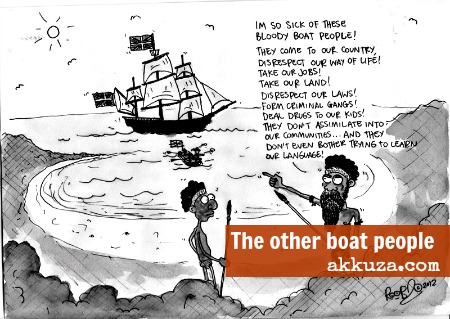The agreement between Australia and Papua New Guinea (PNG) regarding the treatment of Australia’s waves of boat people made the breaking news early this morning. Australia, it was announced, would be forwarding any refugee (asylum) seekers to PNG for processing and should their application become valid these asylum seekers would be resettled in PNG and not Australia. The arrangement is valid for twelve months and is subject to an annual review. In Rudd’s own words:
“Our expectation … is as this regional resettlement arrangement is implemented, and the message is sent loud and clear back up the pipeline, the number of boats will decline over time as asylum seekers then make recourse to other, more normal UNHCR processes to have their claims assessed,” Mr Rudd said.
No sooner had the news made the world wide web that repostings of the BBC report were being made on social networks by Maltese users – with such illuminating comments as “food for thought”. No doubt they believed that this move vindicated Joseph Muscat’s push-back ploy, and a cursory look at the facts behind the deal show that they there is no doubt that this is not a similar scenario. Let’s see why.
1. Human Rights
Yep. You have to begin there. The agreement means that the refugees are shifted to another point to have their asylum request processed. They are not shepherded onto a plane (with the added trauma of separating the healthy from the weak), they are not denied access to a lawyer or HR institutions and above all their entitlement to have their request treated is not prejudiced. Papua New Guinea is a signatory to the UN Refugees Convention – not an unstable country in the process of reconstruction. Here’s Rudd again:
“I understand that this is a very hard line decision,” Mr Rudd said. “But our responsibility as a government is to ensure that we have a robust system of border security and orderly migration, on the one hand, as well as fulfilling our legal and compassionate obligations under the refugees convention on the other,” he added. (9msn)
It’s not exactly a “stamping of feet” or “wake up and smell the coffee”. The Australian PM is aware that no matter how hardline you may get the combined duty of compassion and international obligations must and will be respected. A far cry from bluffing to break the law.
2. Promised Land Delayed.
It’s not all hunky dory. Australia is the land of promise for the people in that region. Not PNG, not Nauru. That however is what Rudd is banking on. His plan is a disincentive to smugglers who thrive on these illicit tours and mortal trips across the seas by sending out a message that the final destination will not be the land of Oz. It plays perfectly into the hands of recent “atavistic fears” aroused among the Australians – angry above all, at the lack of effort by recent arrivals to assimilate to the Ozzie culture. Settlers will instead have to adapt to New Guinean (Papuan?) culture since PNG has accepted for the refugees to be resettled within its borders.
A few notes on PNG will show that this is a growing democracy which is still plagued by a poverty gap with vast swathes of unexplored land. Fair game? So why did PNG accept the deal?
3. Money talks.
Well the PNG deal follows up on an earlier deal with Nauru. In both cases asylum seekers heading for Australia are (will be) rerouted to an asylum processing centre based on PNG or Nauru. The asylum centres are set up and maintained by Australia. That means that the money to pay for, monitor and run the centre comes from Australian coffers. Earlier centres were heavily criticised by the UNHCR for their conditions (a familiar story?) but Australia has pledged to build a new centre in PNG. That’s not just it… PNG needed more than a spanking new asylum centre to sign the dotted line and this is what it got:
In exchange for PNG’s agreement, Australia will fund further aid initiatives. These include redeveloping a major referral hospital in Lae, PNG’s second largest city, and assisting with its long-term management. Australia will also supply half the funding to reform PNG’s university sector and in 2014 implement the recommendations of an Australia-PNG education review. As well, it will support professional management teams in health, education and law and order. “And Australia, prime minister, stands ready to assist PNG further with other development needs in the future,” Mr Rudd said to Mr O’Neil. “That’s what friends are for.” (9msn)
International Cooperation
So Australia’s Rudd does get to shake the waters in the field of immigration policy. He admits that the PNG-Australia agreement might be challenged in the courts but also hopes that this will open the way for new global discussions on the treatment of immigrants and asylum seekers. The agreement exploits what Rudd seems to treat as a loophole in the international convention. The convention prohibits repatriation of asylum seekers but, according to Rudd’s reading does not prohibit resettlement in a different country – such as PNG.
Australia also plans to convene an international conference of transit and destination countries to consider how to improve global arrangements for refugees. The conference would consider the adequacy of processing arrangements and how Australia, the US, Canada and other countries could deal better with the resettlement issues.
So, no real stamping of feet. No threat to break international rules. The Australian PM gave his reassurances of compassionate treatment of the asylum seekers while setting up a framework the compatibility of which remains to be tested under international obligations. Having said that the way Rudd moved is diametrically opposed to what happened in the Maltese scenario.
That essentially is the difference between a statesman and a tantrum thrower fanning the flames of nationalistic fears. So, yes, food for thought indeed.

